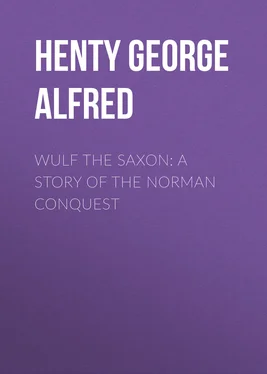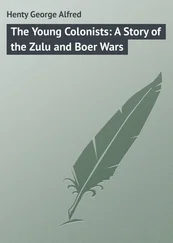When the meal was over, one of the duke's pages who was about the same age as Beorn asked him what they were going to do with themselves.
"If you have nothing better," he said, "will you ride with me to my father's castle, it is but five miles away? My name is De Burg. I can promise you a hearty welcome. My father was one of the knights who accompanied the duke when he paid his visit to England some fifteen years ago, and he liked the country much, and has ever since spoken of the princely hospitality with which they were received by your king. He did not meet Earl Harold then."
"No, the earl with his father and brothers was away in exile," Wulf said rather shortly, for that visit had been a most unpleasant one to Englishmen. It had happened when the Norman influence was altogether in the ascendant. The king was filling the chief places at court and in the church with Normans, had bestowed wide domains upon them, and their castles were everywhere rising to dominate the land. Englishmen then regarded with hostility this visit of the young Norman duke with his great train of knights, and although at the return of Godwin and his sons the greater portion of the intruders had been driven out, their influence still remained at court, and it was even said that Edward had promised the duke that he should be his successor.
It was true that Englishmen laughed at the promise. The King of England was chosen by the nation, and Edward had no shadow of right to bequeath the throne even to one of his sons much less to a foreign prince, who, although related to himself by marriage, had no drop of English blood in his veins. Still, that the promise should ever have been made rankled in the minds of the English people, the more so as the power of Normandy increased, and the ambition as well as the valour of its duke became more and more manifest According to English law the promise was but an empty breath, absolutely without effect or value. According to Norman law it constituted a powerful claim, and Duke William was assuredly not a man to let such a claim drop unpressed.
Wulf had heard all this again and again, and the prior of Bramber had explained it to him in all its bearings, showing him that little as Englishmen might think of the promise given by Edward so long ago, it would be likely to bring grievous trouble on the land at his death. He might perhaps have said more in reference to William's visit had not Beorn at once accepted the invitation to ride with young De Burg to his father's castle.
CHAPTER VI. – RELEASE OF THE EARL
In a few minutes the three horses were brought out. Wulf and Beorn were much pleased with the animals that had been placed at their service. They were powerful horses, which could carry a knight in his full armour with ease, and seemed full of spirit and fire. They were handsomely caparisoned, and the lads felt as they sprang on to their backs that they had never been so well mounted before.
"You would have made the journey more quickly and easily if you had had these horses three days ago," young De Burg laughed.
"Yes, indeed. There would have been no occasion to hide in the woods then. With our light weight on their backs they would have made nothing of the journey."
"You must not expect to see a castle," De Burg said presently, "though I call it one. In his early days the duke set himself to destroy the great majority of castles throughout Normandy, for as you know he had no little trouble with his nobles, and held that while the strength of these fortresses disposes men to engage either in civil war or in private feuds with each other, they were of no avail against the enemies of the country. My father, who is just the age of the duke, was his loyal follower from the first, and of his free will levelled his walls as did many others of the duke's friends, in the first place because it gave the duke pleasure, and in the second because, had only the castles of those opposed to the duke been destroyed, there would have been such jealousy and animosity on the part of their owners that matters would never have quieted down in the country. Thus it is that throughout the land you will find but few castles remaining. The nobles felt it strange at first to be thus dwelling in houses undefended against attack, but they soon learnt that it was far more convenient than to be shut up within massive walls, and the present dwellings are much larger and more comfortable than those of former days. The duke said rightly that the abolition of fortresses well-nigh doubled his fighting power, for that so many men were required to garrison them as to greatly diminish the number their lords could take with them into the field. You do not have castles in England, do you?"
"No, we live in open houses, and hold that it is far better and more pleasant to do so. There is no fighting between neighbours with us. The great earls may quarrel and lead their forces into the field, or may gather them against Danish and Norwegian pirates, but except on these occasions, which are rare, all dwell peaceably in their homes."
The horses were fresh, and the five miles quickly passed over.
"There is the house," De Burg said, pointing to a large building standing on an eminence. It was castellated in form, and much of the old building had been incorporated with the additions, but the outer wall had been pulled down and the moat filled up. Broad casements had replaced the narrow loopholes, and though the flag of the De Burgs still waved over the keep, which stood a little apart from the rest, the family no longer dwelt in it.
Конец ознакомительного фрагмента.
Текст предоставлен ООО «ЛитРес».
Прочитайте эту книгу целиком, на ЛитРес.
Безопасно оплатить книгу можно банковской картой Visa, MasterCard, Maestro, со счета мобильного телефона, с платежного терминала, в салоне МТС или Связной, через PayPal, WebMoney, Яндекс.Деньги, QIWI Кошелек, бонусными картами или другим удобным Вам способом.












